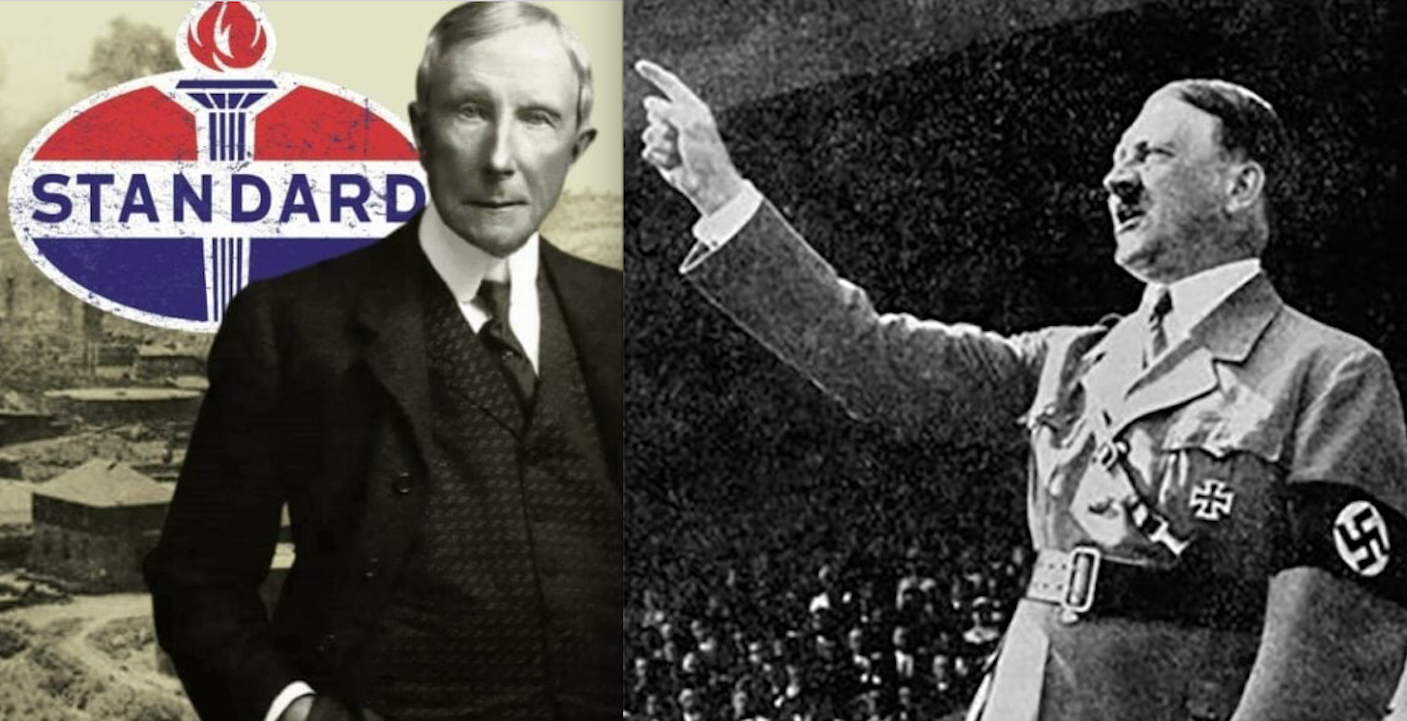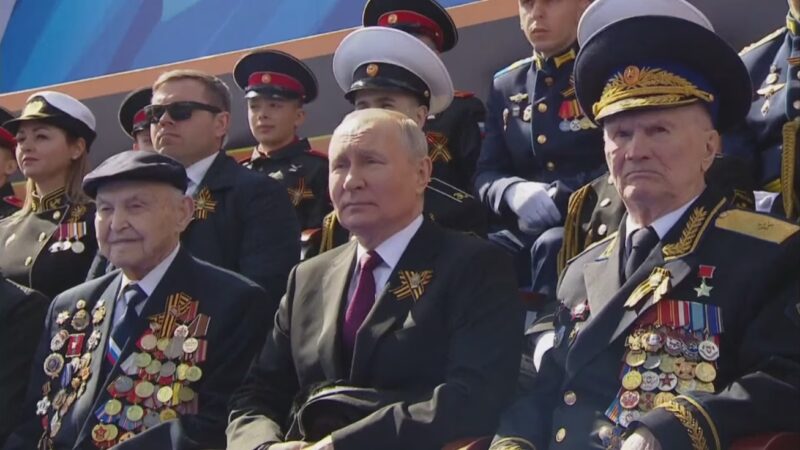Why Rockefeller’s Standard Oil was Axis Ally of Hitler & Nazis

Historical introduction
Standard Oil Company, Inc., was an American oil production, transportation, refining, and marketing company that operated from 1870 to 1911. At its height, Standard Oil was the largest petroleum company in the world, and its success made its co-founder and chairman, John D. Rockefeller, among the wealthiest Americans of all time and among the richest people in modern history. Its history as one of the world’s first and largest multinational corporations ended in 1911, when the U.S. Supreme Court ruled that it was an illegal monopoly.By 1911 the Supreme Court of the United States ruled, in Standard Oil Co. of New Jersey v. United States, that Standard Oil of New Jersey must be dissolved under the Sherman Antitrust Act and split into 43 companies. Several of these companies were considered among the Seven Sisters who dominated the industry worldwide for much of the 20th century, and both Standard Oil’s direct and indirect descendants make up Big Oil.Two of these companies were Standard Oil of New Jersey (Jersey Standard or Esso), which eventually became Exxon, and Standard Oil of New York (Socony), which eventually became Mobil; those two companies later merged into ExxonMobil. Further BP is a continuation of the Anglo-Persian Oil Company which acquired Standard Oil of Ohio and Standard Oil of Indiana, Marathon Oil and Marathon Petroleum, continuations of The Ohio Oil Company, ConocoPhillips and Phillips 66, continuations of the Continental Oil Company.
I. G. Farbenindustrie AG (German for ‘Dye industry syndicate stock corporation’), commonly known as IG Farben (German for ‘IG Dyestuffs’), was a German chemical and pharmaceutical conglomerate. Formed in 1925 from a merger of six chemical companies—BASF, Bayer, Hoechst, Agfa, Chemische Fabrik Griesheim-Elektron, and Chemische Fabrik vorm. Weiler Ter Meer —it was seized by the Allies after World War II and divided back into its constituent companies.
Described as “the most notorious German industrial concern during the Third Reich” in the 1940s the company relied on slave labour from concentration camps, including 30,000 from Auschwitz, and was involved in medical experiments on inmates at both Auschwitz and the Mauthausen concentration camp. One of its subsidiaries supplied the poison gas, Zyklon B, that killed over one million people in gas chambers during the Holocaust.
All links to Gospa News articles have been added aftermath.
Standard Oil: Axis Ally
by Michael Straight
This article appeared in the April 6, 1942 issue of the magazine The New Republic
IN THE MIDST of the storm and the thunder, the lightning strikes. American industry and the press have demanded of labor whether, after opposing a cut in wages, it dares to look General MacArthur in the face. Now we demand of industry whether General MacArthur would prefer to stare at Walter Teagle, Frank Howard, and the other officials of Standard Oil, members of a conspiracy with a Nazi corporation to hold back the development in America of a vital war material, synthetic rubber.
From Thurman Arnold’s testimony before the Truman Committee, it is clear that while the American people were moving toward an alliance with the democracies, great sectors of American industry were strengthening their ties with Fascist Germany. In these illicit relationships, the seizure of power by Hitler, the aggression upon the allies, the fall of France, and the entry of America into the war were seen as incidental factors, which did not disturb the underlying solidarity of business deals. It is equally clear that these deals were as much, and as consciously a part of Hitler’s means of weakening us from within as were his own fifth columns.
There is nothing new in the story of Standard Oil. The first of these conspiracies was the case of beryllium, exposed four years ago by the Temporary National Economic Committee.
There was the wrong and unlawful conspiracy between Alcoa and I.G. Farben, by which the production of magnesium was suppressed in American while Germany developed the greatest magnesium industry in the world. There was the conspiracy between General Electric and Friedrich Krupp of Essen by which the Krupp works was given power to decide who in America might be permitted to produce tungsten carbide. Tungsten carbide is so vital a part of the process of hardening machine tools that if we possessed it in quantity now we could raise our industrial production by 20 percent. Yet, in 1938, by an agreement which was extended to 1950, the production of tungsten carbide was restricted in America, and its price was raised to ten times the cost of production. Today few men in America are trained to use the tungsten carbide that we are beginning to produce.
There was the conspiracy by which the Shering Corporation of New Jersey undertook to supply the contracts of Shelton A.G. of Germany in Latin America for the duration of the war. The Shering Corporation agreed to label its good with the Shering A.G. trademark, and to sell only through German dealers. In these ways it broke the British blockade, helped to finance Nazi agents in Latin America, and perpetuated the German monopoly—all for its own profits.
There was the further conspiracy by which the General Aniline and Film Corporation, of which Walter Teagle was a board member and Edsel Ford a large stockholder, undertook to limit the production in America of certain photographic supplies. There were the conspiracies involving the Bayer Company, Bausch and Lomb, and the armaments firm which at the dictation of Germany refused to supply Britain after the war had begun. We know little about these agreements because, in almost every case, as the Department of American Justice caught up with these firms, they pleaded nolo contendere and hid their guilt in Grand Jury hearings.
In most of these conspiracies I. G. Farben, the great German chemical-warfare and poison-gas concern, is the counterpart to the American monopoly. With the Standard Oil Company, the “marriage,” as I. G. Farben called it, took place in 1929. The dowry which I. G. bestowed upon its bride was the control in clear world markets of I. G.’s patents covering oil and synthetic gasoline. In return, the bridegroom received full powers over the production, even within the United States, of the chemical children of the union, including synthetic rubber.
Even when the marriage was consummated, I. G. Farben was a center of anti-democratic propaganda and illicit war preparation within Germany. It helped Hitler to take power and then became a basic part of Hitler’s world organization of agitation and espionage,
Jan Valtin testified before the Dies Committee in 1941 that “the I. G. Farbenindustrie, I know, from firsthand experience, was already in 1934 completely in the hands of the Gestapo. It went so far as to have it’s own Gestapo prison on the factory grounds at Leuna., and I. G. Farben began particularly after Hitler’s ascent to power, to branch out into foreign fields.” In Spain, according to a recent pamphlet, I. G. Farben’s representatives financed Franco; in Rumania, the Iron Guard; in the thirteen Latin American republics in which they were established, I. G. Farben’s subsidiaries became the center of the local Nazi organizations.
But none of this disturbed the happy marriage. Standard realized, as early as 1935, that IG was withholding from it information concerning synthetic rubber. The reason, a Standard official reported, was that “the Hitler government does not look with favor upon turning the invention over to foreign countries.” This disfavor, Howard told an executive committee of Standard, arose “because of military expediency.” Yet it was not this fact that troubled the committee. “Mr. Howard,” the executive committee’s report reads, “deplored the fact that the German government’s restrictions on I.G.’s freedom of action have prevented our making material progress in the American field, particularly as there is some indication that the American rubber companies are making independent progress.”
Yet between 1932 and 1942 Standard never considered allowing a synthetic-rubber industry to develop in America. It discouraged every attempt by the rubber companies, already concerned with the insecurity of their sources of supply, to create an alternative, domestic source. “Until we have permission,” Howard wrote in 1938, “there is absolutely nothing we can do, and we must be specially careful not to make any move whatever, even on a purely informal, personal or friendly basis, without the consent of our friends. We know some of the difficulties they have…from a national standpoint in Germany….The only thing we can do is loyally to preserve the restrictions they have put upon us.”
US, Germany and Italy alongside Ukraine in opposing UN anti-Nazi Resolution
Then, shortly before the war, Standard’s chemists developed a new synthetic rubber, butyl. In 1938, according to Thurman Arnold’s testimony, “while the Hitler government for military reasons was refusing to make available to this country the German buna rubber, Standard sent to I.G. Farben information as to the American butyl rubber.” A few months later the United States Navy became interested in the development of butyl. The navy’s Bureau of Construction sent a Mr. Werkentheimer to inspect Standard’s laboratory. “As agreed upon,” a Standard official reported, “I took Mr. Werkentheimer over to the K plant when it appeared that I could not very well steer his interest away from the process. However, I am quite certain that he left with no picture of the operations,” other than a most general one.
At the same time Standard was aiding the Nazis in the construction of a refinery for aviation gasoline although it knew that the refinery was integral part of the German four-year-plan of autarchy and preparation for war.
Did Germany’s war upon the Allies lead the bride to sue for divorce? Why should it? In 1939 a new vow was made to continue the marriage in wartime.
Howard met with representatives of I.G. in Holland. “We did our best,” he reported, “to work out complete plans for a modus vivendi which would operate through the term of the war, whether or not the U.S. came in.”
So the battle of France found Standard busily engaged in reallocating its world markets with I.G. and putting pressure on Shell to go along in abandoning its patent rights over the French market. Then the military conquest of France might be followed by the economic conquest of France under I.G. Farben.
In February, 1941, Standard was also refueling Italian airlines carrying mail and documents from Brazil and possibly industrial diamonds. When Secretary Hull objected, Standard continued this service to the Axis over Hull’s protests.
Even more revealing than these instances of deception is the state of mind of American industry which Arnold’s testimony exposes. Frank Howard, in reporting upon his meeting with the IG officials in 1939, spoke of the difficulties of maintaining normal contacts during the “period of the war.” In September, 1939, Standard cabled to the Japanese monopoly, Mitsui, proposing that they prepare the way at once for the reëstablishment of commercial relations “after any interruptions in our trade,” which Standard feared might come.
https://www.gospanews.net/2023/03/08/le-veline-bipartisan-del-nuovo-fuhrer-zelensky-sorrisi-di-donna-per-aggraziare-le-armi-dei-signori-della-guerra-nwo/
In other words, American industry believes that either the Axis will triumph or there will be a negotiated peace. In either event our industrialists are ready now to reëstablish open bonds within the Axis, partly out of respect for German scientific superiority; partly out of jealousy for the great British combines; partly out of fear for the new American companies which are breaking their way into the pastures of monopolies through defense contracts and which, by their energies, may get over the major share of shrinking markets when the war is over.
But is this as innocent as it looks? Sooner or later business men who ally themselves with fascism become fascists; and once fascism captures economic control, then a fascist coup must follow to seize political power.
St. Pio’ Prophecy on Christians’ homelands, NWO Rockefeller’s Abortion law and Masons war
Is there any understanding of this danger in America? “Standard Oil delayed the use of buna rubber in this country,” Thurman Arnold testified, “because Hitler did not wish to have the rubber exploited here.” Yet who was punished? Standard for dealing with the enemy, or Arnold for exposing the deal? Standard escaped with a light consent decree, free to remarry later on. But two days after Arnold testified, the War Department, backed by American industry, won its long fight to silence the Anti-Trust Division for the duration of the war; there are to be no more prosecutions of monopolies which are contributing to the ware effort and those are, of course just the ones that Hitler courts in marriage.
What of our patent laws, the weapons of self destruction with which Hitler bound and chained us? Are they to remain? Probably. Yet who pretends that even the most dramatic revision of these laws would save us? There is a deeper sickness of the isolation of scientific knowledge behind corporate walls. It would take a fortune now for a new competitor to find out by independent research, what Standard and General Electric have already discovered and are keeping to themselves. At heart we all know that public ownership alone can free our strength.
We this now as in a dream. We are in a chariot racing through a dark forest pursued by wolves. The driver whips the horses and suddenly we see that they are not horses, but ostriches. Are we to dash out and hunt for horses, or are we to try and drive the ostriches? The dream chokes us as we awaken.
by Michael Straight
This article appeared in the April 6, 1942 issue of the magazine The New Republic
LINKS SOURCES
GOSPA NEWS – WEAPONS LOBBY DOSSIER
GOSPA NEWS – INVESTIGATIONS – OSINT – INTELLIGENCE
Biography of the author Michael Straight
Michael Whitney Straight (September 1, 1916 – January 4, 2004) was an American magazine publisher, novelist, patron of the arts, a member of the prominent Whitney family, and a confessed spy for the KGB.
While a student at Trinity College, Cambridge in the mid-1930s, Straight became a Communist Party member and a part of an intellectual secret society known as the Cambridge Apostles. Straight worked for the Soviet Union as part of a spy ring whose members included Donald Maclean, Guy Burgess, Kim Philby and KGB recruiter Anthony Blunt. A document from Soviet archives of a report that Blunt made in 1943 to the KGB states, “As you already know the actual recruits whom I took were Michael Straight”.
Straight finished third in the 1934 South African Grand Prix, a race dominated by his brother Whitney.
After returning to the United States in 1937, Straight worked as a speechwriter for President Franklin D. Roosevelt and was on the payroll of the Department of the Interior. Beginning in 1938, Straight carried on a covert relationship with Iskhak Akhmerov, the KGB spy. In 1940, Straight went to work in the Eastern Division of the United States Department of State.
In 1942, Straight joined the United States Army Air Forces, where he served as the pilot of a Boeing B-17 Flying Fortress, although he never saw combat. After the war, he took over as publisher of The New Republic, which was owned by his family. During his tenure, Straight hired former US vice president and future presidential candidate Henry A. Wallace to serve as the magazine’s editor. Straight’s writing for the magazine included a glowing review of J. R. R. Tolkien‘s The Lord of the Rings when it was published. In 1956, Straight left the magazine and began writing novels.
However, in 1963, in response to an offer of government employment in Washington, D.C., Straight faced a background check, and decided voluntarily to inform family friend and presidential special assistant Arthur M. Schlesinger, Jr. about his communist connections at Cambridge. This led directly to the exposure of Blunt as the recruiter of the Cambridge Five spy ring.
Straight served as the deputy chairman of the National Endowment for the Arts from 1969 to 1977. In 1988, he published Nancy Hanks: An Intimate Portrait, which told the story of the second chairman of the National Endowment for the Arts, with whom he had worked.




5 pensieri su “Why Rockefeller’s Standard Oil was Axis Ally of Hitler & Nazis”